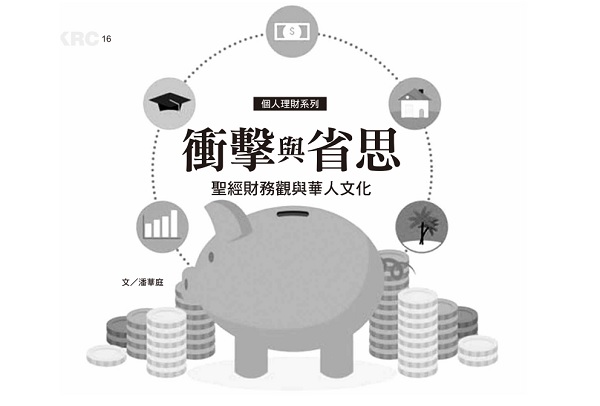Shock and Reflection
[Personal Finance Series] Biblical Financial Views and Chinese Culture

Therefore a man will leave his father and mother and be united to his wife, and the two will become one flesh. ” (Genesis 2:24)
Common traditional Chinese financial planning customs
When I discuss financial planning and asset allocation with clients, the key factors that influence thinking and decision-making are often Chinese traditional customs and culture. For example:
1. Hope to buy a house for their children
Parents are often worried that the current economy is bad and it will be difficult for their children to make money. If they can buy a house for them, it will definitely reduce their children's mortgage burden and show their love for their children.
2. Adult children live with their parents, and the second and third generations live under the same roof.
Parents who cannot afford real estate to their children often feel distressed that their children have to bear the rent, housework, meals, pick up and drop off their young children, and have difficulty saving money... Of course, children who are willing to live with their parents are often regarded as filial to their parents, and parents are considered to be blessed because they live under the same roof for multiple generations.
3. Uneven management and distribution of money, causing family members to fight each other to death for money.
The traditional Chinese concept of "there is land and wealth" has resulted in a relatively high proportion of elders owning real estate. This phenomenon makes it more difficult to make gifts, inheritances or property divisions, making it difficult to handle them fairly.
4. The phenomenon of property being passed down from son to daughter is still common.
In Taiwan, all children have the right to inherit property according to law, but the culture of favoring boys over girls is still particularly clear when inheriting or donating property. According to the latest survey results, although this situation has improved in metropolitan areas due to the declining birthrate, the phenomenon of daughters being forced to give up inheritance due to moral persuasion is still common among large families or extended families in rural areas. According to statistics from the Ministry of Finance, nearly 70% of those who own inheritances in Taiwan are men, and more than half of the heirs who abandon inheritances are women, which shows that inheritance distribution still tends to be passed down to sons rather than daughters. NoteNotes

▲Wedding: A man leaves his parents and joins his wife, and the two become one flesh.
The influence of traditional Chinese financial customs
1. Children lack the ability to be financially independent and have opportunities for life growth.
Many people who have been working for many years, whether single or married, still ask their parents for money from time to time even though they have income; those who live with their parents rarely share housework or living expenses. Sometimes it is because parents take care of their children as if they have not grown up, causing the children to lose many opportunities to experience life.
2. Loss of ability to take responsibility and solve problems
Children who have been under the protection of their parents for a long time and accept their arrangements for everything big and small develop a selfish character and dependent habits. They not only leave their own responsibilities to their parents, but also lack the ability to think independently and solve problems. In recent years, many companies simply invite their parents to come along when interviewing new recruits.
3. Habitual reliance on parents and ingratitude
In recent years, the proportion of the elderly (those who do not work, live on their parents' savings and pensions, or live in their parents' homes for a long time and rely on their parents for support) has been increasing year by year. In particular, there are reports of violence against parents due to unsuccessful demands for money. Commonly seen.
4. Disagreement between husband and wife leads to problems of getting along with mother-in-law and daughter-in-law and intergenerational upbringing.
If you live with your parents after marriage, you often transfer your responsibilities as a husband, wife, father, and mother to your parents; giving priority to your parents' opinions and ignoring your spouse's opinions, feelings, and needs. If you have children, it is more common for you to have disagreements over the discipline of your children. Over time, the problem will snowball and become difficult to deal with, and your children's marriages may even be damaged or divorced.
5. Let children lose their fighting spirit and the opportunity to challenge themselves.
Because they have parents' financial support or sharing of responsibilities, children pay more attention to the enjoyment of life: driving better cars than their parents, traveling, shopping, eating big meals, etc. They have no motivation to accept challenges and do not set goals for themselves, which is a pity. However, most of the previous generation lived frugally. I often think that the greatest happiness and satisfaction in life are often the results of hard work, sweat and tears. Only such results can be enjoyed and enjoyed throughout life, but they do not have such enjoyment.
6. Parents don’t know whose money belongs to them and want to leave it to their children.
Deuteronomy 8:17 says, “Lest you say in your heart, ‘My strength and my ability have earned this wealth.’” Most parents, even Christians, often mistakenly believe that wealth is earned by their own ability. , forgetting that the ability to obtain wealth comes from God, and that the owner of money is God, so they do not ask God how to manage and use the money, and they only want to leave it to their children.
Four important financial concepts that God wants us to learn
Genesis 2:24 mentions: "A man will leave his father and mother and be united to his wife, and the two will become one flesh." If you think about it carefully, you will be surprised to find that this is contrary to our Chinese traditional customs and culture. In traditional Chinese culture, not living with parents often gives people the impression of being unfilial; but the Bible points out that people should leave their parents. Doesn't this seem to be treason? If you do this, how can your parents be embarrassed? Is it possible that when your children reach adulthood and their wings harden, they want to fly away? Sometimes even if parents don't say it, there is an invisible thread pulling their children. But there are as many as ten places in the Bible that mention: Honor your parents. For example: "Honor your father and your mother, so that your days may be long in the land that the LORD your God is giving you." (Exodus 20:12)

▲The Creation of Eve, Michelangelo’s fresco. "A man will leave his father and mother and cleave to his wife, and the two will become one flesh." (Genesis 2:22)
Image source: Michelangelo, Creation of Eve, 1508-12 (Sistine Chapel, Vatican, Rome) https://spectatio.wordpress.com/2012/05/21/sistine-chapel-all-about-eve/
So, when there seems to be a conflict between leaving our parents and honoring our parents, what does God want us to learn? Let me share four important concepts from a biblical financial perspective:
1. God wants us to be financially independent
Haggai Chapter 2:8: "The silver is mine, and the gold is mine, says the Lord of hosts." Leaving your parents is the beginning of true growth and maturity. When I was a child, in my memory, a boy started to become a man with shoulders when he became a soldier. Being a soldier means leaving home and parents, living alone, facing and solving problems alone. In particular, you no longer rely on your parents for financial support, learn to plan your life and future, and plan and allocate your own finances. When you realize that gold and silver come from God, you can become a loyal, kind and knowledgeable steward. Even if you are not married yet, you must be financially and financially independent.
2. God wants us to work diligently and take responsibility
Proverbs 6:6-8: "Go, you sluggard, and watch the actions of the ants, and you will gain wisdom. The ants have no captain, no ruler, no king, yet they prepare their food in the summer and gather their food in the harvest." God does not As long as we work, we must also enjoy the fruits of our efforts through diligent work. "Gathering food" requires us to save and plan; the scripture mentions "there are no captains, no officers, and no kings", reminding us to learn to take the initiative to take responsibility and manage what God has given us without any pressure or requirements. wealth. Those who enter into marriage must be committed to each other. Change from listening to your parents' advice on everything to prioritizing discussions with your spouse, sharing responsibilities, facing and solving problems together, no longer relying on your parents for everything, and taking full responsibility for your new family. (In fact, this should also be true for those who have not yet entered into marriage.)
3. God wants parents to learn to let go
Galatians 4:1-2: “I say that he who inherits an inheritance, though he is the master of it all, is no different from a slave when he is a child; he is in the hands of a master and a steward until his father "It's time to make the reservation." I often hear many parents say to their adult children: "There is no shortage of dishes and chopsticks in the house." It means: the work is too hard, if you don't want to do it, don't do it. Because they feel sorry for their children and endure hardships, the result is that the children are pampered, constantly changing jobs, complaining about their bosses, and even becoming a “money earner” (who spends all their monthly salary and has no savings). Many of them are children of members of the Lord. The scripture here specifically mentions that "when they are children, they are no different than slaves", which means that God wants parents to train their children to do things from an early age, just like they train slaves; they must be trained under masters and stewards. This made me think: Sometimes you even have to change your children to teach them, so as not to hinder your children's learning and growth because of your own softness. When the children grow up and can live independently, let them be independent and let them raise and discipline their own children to form a cycle of inheritance, that is, "until the time appointed by his father comes."
4. God wants parents to learn to trust and believe in God’s promises and provisions
Proverbs Chapter 13:22 says: "A good man leaves an inheritance to his descendants, but sinners store up treasures for the righteous." Although God allows good people to leave an inheritance to their descendants, he also needs to go through a lot of discipline and training to ensure that the children have enough ability. The inheritance is left behind, because Proverbs 20:21 of the Bible reminds parents: "Inheritance that is quick at first will not be a blessing in the end." Therefore, when parents blindly want to give wealth to their children, can they think more deeply about:
1. When God gives us wealth beyond what we ask or imagine, does it require us to dedicate more to the work of God’s kingdom, or does it require us to leave it to our children?
2. If God gives us wealth, won’t he also give enough grace to our children?
3. Is it really a blessing for our children to own the inheritance we left behind? In other words, before leaving worldly property to your children, you should first give your children spiritual property so that they can fear God and manage and manage the worldly property in accordance with biblical principles.
Reshaping the concept of wealth and parent-child relationship
I have many clients (especially Christians) who, after truly understanding that God wants to use money to fulfill God's will in their lives, have readjusted the discipline of their children and the control of wealth, and the parent-child relationship has slowly changed for the better. . For example: children are willing to start working and help with housework and family expenses; they understand that money and property are given to parents by God to complete God’s work, and the future may not all be reserved for themselves, etc. As a result, these clients not only have responsibility and hope for their own lives, but also encourage their children to pursue God, get close to God, and experience God on their own.
Dear friends, although traditional culture may have caused us to be influenced by secular values since childhood, because we fear God, we can have new perspectives. Psalm 111:10 says: "The fear of the Lord is the beginning of wisdom; whoever obeys His commandments is a wise man. The Lord is to be praised forever!" Ask God to help us deal with money and property wisely. God " What is required of a steward is that he be faithful.” (1 Corinthians 4:2) Ask God to help us teach our children to be faithful, especially to seek God’s will when it comes to the use of money. “Train up a child in the way he should go; even when he is old, he will not depart from it.” (Proverbs 22:6) May God bless you.
Note:
See www.pwc.tw/zh/news/media/media-20150315.html
The editor recommends further reading:
1. Wen Yingqian, "Money and Marriage in the Spiritual Family", "Ambassador Magazine", July-August 2015, website www.ambassadorsmagazine.org/category articles/marriage and family/Money and Marriage in the Spiritual Family Relationship-Wen Yingqian/?lang=hk.
2. Wen Yingqian, "Five Questions to Prevent Financial Conflicts Among Relatives," True Love Family Magazine, December 2016, URL: www.familykeepers.org/magazine/Archive/FK092/p03.htm.
 Author profile
Author profile
Pan Huating, CEO of Taiwan's Antai Insurance Brokers Company, holds international financial planner and psychological counselor certificates, and is a teacher at the Joshua School of Management of the Chinese Boaz Association. He loves life and devotes himself wholeheartedly to domestic and foreign gospel ministries, serving the disadvantaged in rural areas and poverty alleviation projects. He also participates in the ministries of entrepreneurs achieving kingdom enterprises and the Great Commission, and using his life to influence lives.
